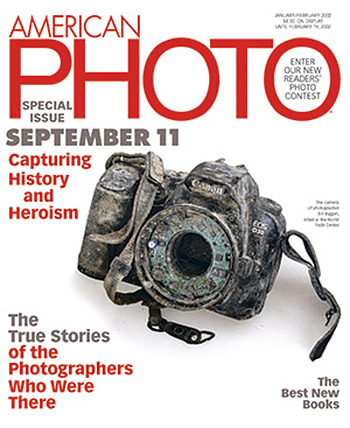Few honors in this industry are as impactful as being asked to partner with a camera brand. It is a show of trust and mutual respect and serves to solidify a relationship that centers around what many of us love most – photography. It is a both a great honor and significant responsibility all at once.
My journey to today’s announcement of joining Canon has been a long one. In 2001 I had been saving all the money I could; even choosing to go to college without a car in order to save up for my very first digital camera. The decision over which one to purchase resulted in endless hours of research, with the largest influence coming from a most unexpected source – a magazine cover that I happened to come across at the time.
 When the World Trade Centers were attacked, a photojournalist named Bill Biggart was lost doing what he loved most – documenting history. In many ways he embodied everything a photographer could be. He was good man that saw art through the lens, and he created storytelling images that moved us all forward by informing the world. I would give anything to have been able to shake his hand and thank him for the inspiration. It was the picture of his camera, a Canon D30, on the cover of American Photo magazine that led my choice for my first digital camera.
When the World Trade Centers were attacked, a photojournalist named Bill Biggart was lost doing what he loved most – documenting history. In many ways he embodied everything a photographer could be. He was good man that saw art through the lens, and he created storytelling images that moved us all forward by informing the world. I would give anything to have been able to shake his hand and thank him for the inspiration. It was the picture of his camera, a Canon D30, on the cover of American Photo magazine that led my choice for my first digital camera.
It arrived January 9th, 2002 at 7pm. I was going on a date that night to go see the Christmas lights at the local zoo. I decided that the first picture with the camera (and the first digital image I ever created) should be of my girlfriend. As fate would have it, I ended up marrying her, and now make it a point to make every first image on all of my cameras a simple photo of my loving wife.
I had so much pride in using the D30. It was not just because it was the single most expensive investment I had ever made, but because it was one of the greatest teachers I have ever had. I made it a point to shoot 100 shots each day with it. Whether I was walking around campus at Arizona State University, or simply back home at my apartment, I let it teach me how to see light, depth, and color. The D30 and I were inseparable… until one fateful day at the San Diego Wild Animal Park. I was meeting up with two of my photo friends, Fred Miranda and Ben Horne, to chat about gear and take photos. I was on a big prime kick with the 35, 85 and 135 L’s, and they had both just gotten the Canon 1D. I have never been one to have gear envy, but I can still remember riding in the car with them to dinner while taking pictures out of the window with their 1D’s just to see what the shutter button felt like. Not long after there was a deal on refurbished 1D’s from Samy’s Camera in LA, and I quickly moved to my first flagship camera.
The Canon 1D is a camera that is in many ways responsible for starting my actual photography career. It was the camera that I used as an intern at the Arizona Republic newspaper, and it was also the camera that I won my first Hearst Award with. I felt invincible with the 1 series body, and have had many iterations of it over the years, with the most successful of them being the 1Ds Mark II. The portfolio I created with it helped me land everything from TV shows to sports advertising campaigns.
As time went on, I actually drifted away from Canon, taking on ambassador roles for two other camera companies. Yet I always kept an eye on them as they held a nostalgic piece of my heart. In January of 2020, I traveled to Las Vegas for what would be my inaugural CES show to catch up and grab drinks with some industry friends. While there, I stopped by Canon’s booth to say hello and catch an early glimpse of the 1DX Mark III. Over the course of an hour, I went from sitting down to look at a camera, to waxing nostalgic about the past, to seeing what Canon’s direction and future would be. I was impressed and excited about everything that was discussed, and left the show optimistic about the future.
A couple of weeks later, Canon USA sent me the EOS R, and a number of RF L lenses on loan. We had no idea of the impending pandemic at the time, and how much the camera and lenses would mean to my art as well as my sanity. At first, I used them around the house, for at the time I was wrapping up a production that was being done on another platform. Not long after the campaign was done, however, the world locked down. While I was scared of what was happening, I took comfort in learning about the system as a distraction from everything. In many ways, the practice I did with the camera helped keep me focused (no pun intended).
As the days turned into months, I moved my family to our house in Northern Arizona and I started heading to the nearby forest to photograph trains. I would give myself challenges sometimes, like manually focusing on fast-moving trains, or pre-setting the exposure without looking through the EVF or at the LCD. It was practice like this that led to true enjoyment of the system and Canon’s approach to the mirrorless world. What I was finding was a re-envisioning of photography existed within the brand. It was refreshing and something I had been hoping would eventually exist within the mirrorless realm. The RF lenses I was testing were not only sharp, but had the character within their rendering that I craved. In Canon, I was finding my eagerness to create once again.
The more I corresponded with the team at Canon, the more I started to view them as family, rather than colleagues. While our discussion started with photography, they began to transform into conversations about life away from the lens. From world events, to how to get through a pandemic with kids at home; it meant a lot to me. It is for this reason, among many others, that made for an easy decision when the offer to become a Canon Explorer of Light came about.
With that, let me say that it is a tremendous privilege to join the Canon team. It is one where I hope my inclusion in such a program will serve the photography community more than my career. It is an appointment that has not just been earned by my work, but by those that I have had the good fortune of learning from, and some that I will never have the ability to thank.
Bill, I never knew you, but this honor is yours as much as it is mine.
Thank you.
